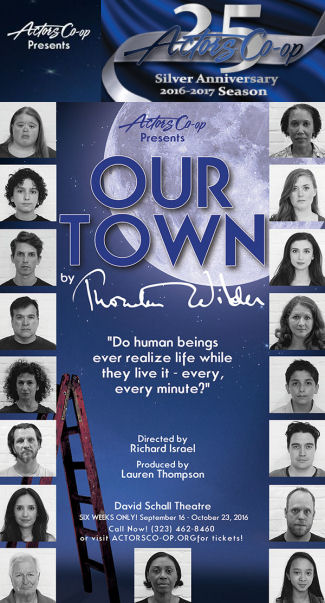
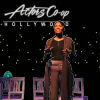 I’m often asked how I pick the shows that we see. The answer is that there are two sources. First, I get all sorts of announcements of shows, and from there I pick the ones I want to see for various reasons. The problem with that, of course, is that I never get forced into something I might not go to see otherwise. For that, I depend on my subscriptions. I find theatres whose quality I like and who tend to have a programming mix that I like, and that are affordable (that’s a big factor), and I subscribe there. In the past, that has included The Colony Theatre (FB) in Burbank and Repertory East Playhouse (“REP”) (FB) in Newhall. I grew to look forward not only to the shows there, but the people that I would see when I went there. Alas, both of those theatres have gone dormant, and I’ve been hunting around for replacements. Over the past few months, I’ve selected two: Actors Co-op (FB) in Hollywood and the Chromolume Theatre (FB) in the West Adams district. Both had strong seasons, produce high quality work, and had great pricing for their seasons. Last night was our first show as a new subscriber at Actors Co-op (FB). It looks like I chose right.
I’m often asked how I pick the shows that we see. The answer is that there are two sources. First, I get all sorts of announcements of shows, and from there I pick the ones I want to see for various reasons. The problem with that, of course, is that I never get forced into something I might not go to see otherwise. For that, I depend on my subscriptions. I find theatres whose quality I like and who tend to have a programming mix that I like, and that are affordable (that’s a big factor), and I subscribe there. In the past, that has included The Colony Theatre (FB) in Burbank and Repertory East Playhouse (“REP”) (FB) in Newhall. I grew to look forward not only to the shows there, but the people that I would see when I went there. Alas, both of those theatres have gone dormant, and I’ve been hunting around for replacements. Over the past few months, I’ve selected two: Actors Co-op (FB) in Hollywood and the Chromolume Theatre (FB) in the West Adams district. Both had strong seasons, produce high quality work, and had great pricing for their seasons. Last night was our first show as a new subscriber at Actors Co-op (FB). It looks like I chose right.
Actors Co-op chose as the first show of their 25th season a classic — but one that I can’t recall seeing in an extremely long time: Our Town, by Thornton Wilder. Even if you’ve never seen Our Town, you think you’ve seen Our Town, because the conceit and basic staging of Our Town is so well known. You know that it is a minimalist play (no real sets, often non-specific costumes). You know that it takes place in Grovers Corners NH. You know that there is a Stage Manager that narrates and directs the action. And thats…. about all you remember. Oh, and you like remember you studied it in High School English class.
Your memory, such as it is, would be correct. Our Town is all of those things. It is a three-act, somewhat metaphysical play about approximately 15 years in the life of Grover’s Corners. The first act presents a typical day (including a birth); the second focuses on love and marriage; and the third on what happens when we reach the end of our lives. The play focuses on the lives of two families: the Gibbs and the Webbs. Dr. Gibbs is the town doctor, and Mr. Webb is the publisher of the town paper. Both families have been in the town seemingly since its founding. The focus of the play is the children of these families: George Gibbs and Emily Webb. As you might have figured out by now: the first act introduces us to all the characters in the town and establishes the relationships, the second focuses on the marriage of George and Emily, and the last act deals with death and its aftereffects.
The traditional question asked of Our Town is what is the meaning of the Stage Manager? Is the Stage Manager intended to be God? Is it meant to imply that there is someone or something directing our lives for some purpose. I’m not going to attempt to answer those questions. To me, the Stage Manager is simply a story-telling device: a way to move the plot-line forward and explain when something is a flash-back or a pop-up explanatory bubble. Don’t let the stage manager phase you.
A better question is what is the meaning of the play: what is the point Wilder wanted you to think about as you left the play. After all, a good play not only entertains, but makes you think. This play won the Pulitzer Prize, so it must be more than just simple mindless entertainment. But for the first two acts, there is no point being made. It is just the story of lives going on. The kicker in this play is the last act — particularly the time that a newly-deceased gets the opportunity to go back and watch a day in their life. At that point, they significance and message of the play kicks in, and the meaning of the first two acts comes clear: We go through our days focused on living our lives and our business and our concerns, and we miss all the people and what is happening around us. Now, mind you, Wilder was writing this play in 1938 about a town at the turn of the 20th century, when life was significantly slower. Consider our lives today, with our faces focused on tiny-little screens, traveling at faster speeds and communicating with orders of magnitudes more even faster. If they were missing what was happening in life back then, how much more are we missing now. At this point, the rationale behind Actor’s Co-op choice of the first play of the season becomes clear: in the 25 years since they started, we’re missing what is going on around us. Perhaps we need to slow down, and, oh, I don’t know, take in a play?
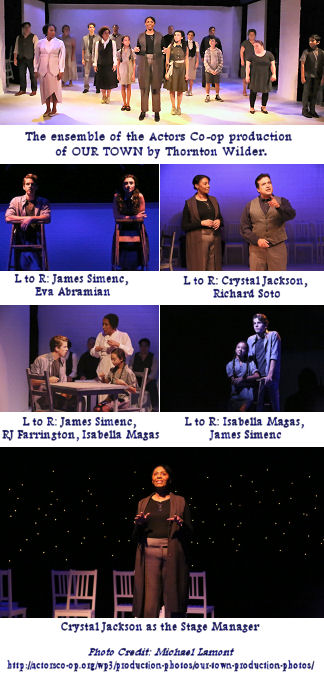 But in the act of observing what is going on around us, we need to observe the changes in society that we might have missed. Actor’s Co-op amplified the ability to observe this by utilizing diverse casting. This not only included diversity in the racial and ethnic dimensions, but the casting of a female Stage Manager in a role traditionally cast as male. They also chose to cast a differently-abled actor as part of the ensemble, demonstrating how in the modern world, being disabled does not mean one cannot be on stage (something we also saw last week at Hunchback). In doing so, however, they highlighted a problematic aspect of Wilder’s presentation. Observe the list of churches that Wilder lists: all are variants of Christianity. Nothing else is in the town. Observe the ethnic makeup described in the first act: Slavs and a few others, and observe that “Polish Town” is far away, on the other side of the tracks. Those Eastern European immigrants — they are kept away from the main town folk. Observe woman’s roles, and what they are expected to do … and behave … and not behave. This play is clearly a product of its time, and the diversity we see on stage would not have, could not have, and did not exist in towns such as Grover’s Corners. Grover’s Corners would see no Muslims or Jews. It wouldn’t see blacks or asians. It wouldn’t talk about its disabled. It wouldn’t tolerate intermarriage. Although not visible from the cast, it wouldn’t tolerate orientation or gender diversity. Observing this aspect of the play makes us, the audience, observe how far we have come in just a little over 100 years. We may not be all the way there yet, but our slow change has been significant, and by putting us back in our past, we can clearly see what we couldn’t see at the time. That’s the second, perhaps more important message, of this play.
But in the act of observing what is going on around us, we need to observe the changes in society that we might have missed. Actor’s Co-op amplified the ability to observe this by utilizing diverse casting. This not only included diversity in the racial and ethnic dimensions, but the casting of a female Stage Manager in a role traditionally cast as male. They also chose to cast a differently-abled actor as part of the ensemble, demonstrating how in the modern world, being disabled does not mean one cannot be on stage (something we also saw last week at Hunchback). In doing so, however, they highlighted a problematic aspect of Wilder’s presentation. Observe the list of churches that Wilder lists: all are variants of Christianity. Nothing else is in the town. Observe the ethnic makeup described in the first act: Slavs and a few others, and observe that “Polish Town” is far away, on the other side of the tracks. Those Eastern European immigrants — they are kept away from the main town folk. Observe woman’s roles, and what they are expected to do … and behave … and not behave. This play is clearly a product of its time, and the diversity we see on stage would not have, could not have, and did not exist in towns such as Grover’s Corners. Grover’s Corners would see no Muslims or Jews. It wouldn’t see blacks or asians. It wouldn’t talk about its disabled. It wouldn’t tolerate intermarriage. Although not visible from the cast, it wouldn’t tolerate orientation or gender diversity. Observing this aspect of the play makes us, the audience, observe how far we have come in just a little over 100 years. We may not be all the way there yet, but our slow change has been significant, and by putting us back in our past, we can clearly see what we couldn’t see at the time. That’s the second, perhaps more important message, of this play.
As I said, the casting and performance were excellent, and it is difficult to single people out. In the leading position was Crystal Jackson/FB as the Stage Manager. She handled the role well, providing believable direction of the actions as well as some wonderful facial expressions and reactions.
The Gibb family was portrayed by R.J. Farrington (FB) as Mrs. Gibbs, David Atkinson (FB) as Dr. Gibbs, James Simenc (FB) as George Gibbs, and Isabella Magas/TW as Rebecca Gibbs. This was a very diverse family — a combination that likely would not have existed in those days :-). All performed strongly; particularly notable was Farrington’s Mrs. Gibbs and Simenc’s George. Again, both went well beyond the words they were speaking to creatively portray their characters through expression and movement.
The Webb family was portrayed by Heather Chesley (FB) as Mrs. Webb, Richard Soto (FB) as Mr. Webb, Eva Abramian (FB) as Emily Webb, and Joseph Arujo/IG as Wally Webb. Again, strong performances here, with the highlights being Chesley’s Mrs. Webb and Abramian’s Emily, and Soto’s discussion with George Webb shortly before the wedding.
Additionally, while preparing this writeup, I discovered the actual age and experience of both Simenc (George Gibbs) and Abramian (Emily Webb). Both had me convinced they were high-school students, so again…. well-played.
Rounding out the cast were: Gunnar Sizemore (FB) [Joe Crowell / Si Crowell]; Tim Hodgin (FB) [Howie Newsome]; Christopher Salazar (FB) [Professor Willard / Simon Stimson]; Deanna Hudgens (FB) [Woman in the Balcony / Dead Woman]; Michael Worden (FB) [Belligerent Man / Joe Stoddard / Constable Warren]; Deborah Marlowe (FB) [Lady in a Box / Mrs. Soames]; Vanessa Benavante (FB) [Sara Craig], Shannon Dieriex (FB) [Choir Member]. Christian T. Chan portrays Willard / Stimson October 7 through 23. Musical accompaniment was provided by Eden Livingood (FB) on Violin, and Jean-Paul Barjon (FB) on Cello.
The production was directed by Richard Israel (FB), whose work we have seen many times — mostly in musicals. Here he was doing a play — and a play with no scenery or real props, at that. Israel is to be applauding for how well he has the actors pantomime as if the props were there, which is combined by excellent sound effects (one might even say Foley Effects). This creates the illusion of existance of a wide variety of props and set pieces, from screen doors to lawnmowers to dishes to glasses to… well, you name it. See the show, and you’ll be similarly amazed.
Turning to the creative and production credits: Rich Rose (FB) was the scenic designer (such as it was). In all seriousness, the scenic design was simple: white chairs, white tables, simple ladders, and such. Sound design was more significant, and Cameron Combe (FB)’s design worked well, providing the sound effects that the cast was unable to produce (he likely also consulted on the other sound effects). Lisa D. Katz (FB)’s lighting design supported everything, serving to focus the audience’s attention to the appropriate portions of the stage and amplifying the mood. Vicki Conrad (FB)’s costume design was modern and definitely not period, but as long as it is not outrageous, almost anything works for this particular show. Rounding out the production credits: Heather Chesley (FB) [Artistic Chair); David Elzer (FB) (Marketing / Publicist); Amanda Rountree/FB [the real Stage Manager]; Lauren Thompson (FB) [Producer]; Selah Victor (FB) [Production Manager]; Anthony Zediker (FB) [Composer].
Our Town continues at Actor’s Co-op through October 23. Tickets are available through the Actor’s Co-op Website. Discount tickets may be available through Goldstar or LA Stage Tix. This is a classic show well worth seeing.
* * *
Ob. Disclaimer: I am not a trained theatre critic; I am, however, a regular theatre audience member. I’ve been attending live theatre and concerts in Los Angeles since 1972; I’ve been writing up my thoughts on theatre (and the shows I see) since 2004. I do not have theatre training (I’m a computer security specialist), but have learned a lot about theatre over my many years of attending theatre and talking to talented professionals. I pay for all my tickets unless otherwise noted. I am not compensated by anyone for doing these writeups in any way, shape, or form. I currently subscribe at Cabrillo Music Theatre (FB), the Hollywood Pantages (FB), Actors Co-op (FB), the Chromolume Theatre (FB) in the West Adams district, and a mini-subscription at the Valley Performing Arts Center (VPAC) (FB). The Chromolume 2017 season looks particularly good: Zanna Don’t (Tim Acito, January 13 – February 5), Hello Again (Michael John LaChiusa, May 5- May 28), and Pacific Overtures (Stephen Sondheim, September 15 – October 8) — all for only $60). Past subscriptions have included The Colony Theatre (FB) (which went dormant in 2016), and Repertory East Playhouse (“REP”) (FB) in Newhall (which entered radio silence in 2016). Through my theatre attendance I have made friends with cast, crew, and producers, but I do strive to not let those relationships color my writing (with one exception: when writing up children’s production, I focus on the positive — one gains nothing except bad karma by raking a child over the coals). I believe in telling you about the shows I see to help you form your opinion; it is up to you to determine the weight you give my writeups.
Upcoming Shows: Next weekend has another Valley Performing Arts Center (VPAC) (FB) event: this time for Jazz at Lincoln Center Orchestra with Wynton Marsalis. The third weekend has yet another VPAC event: An Evening with Kelli O’Hara on Friday, as well as tickets for Evita at Cabrillo Music Theatre (FB) on Saturday. The following weekend brings Turn of the Screw at Actors Co-op (FB) on October 22 and the new Tumbleweed Festival (FB) on October 23. The last weekend of October brings Linden Waddell’s Hello Again, The Songs of Allen Sherman at Temple Ahavat Shalom (a joint fundraiser for MoTAS and Sisterhood).
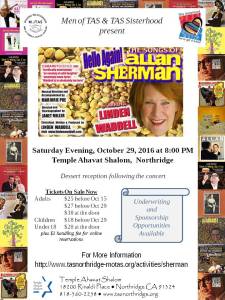 Interrupting this recap for a word from a sponsor: Linden Waddell’s Hello Again, The Songs of Allen Sherman at Temple Ahavat Shalom is open to the community, and is a joint fundraiser for MoTAS and Sisterhood. Please tell your friends about it. I’m Past President of MoTAS, and I really want this to be a success. Click on the flyer to the right for more information. It should be a really funny night.
Interrupting this recap for a word from a sponsor: Linden Waddell’s Hello Again, The Songs of Allen Sherman at Temple Ahavat Shalom is open to the community, and is a joint fundraiser for MoTAS and Sisterhood. Please tell your friends about it. I’m Past President of MoTAS, and I really want this to be a success. Click on the flyer to the right for more information. It should be a really funny night.
Oh, and if that wasn’t enough, October is also the North Hollywood Fringe Festival (FB), although I doubt if we’ll have time for any shows. November will bring Hedwig and the Angry Inch at the Hollywood Pantages (FB); a Day Out With Thomas at Orange Empire Railway Museum (FB) [excuse me, “Southern California Railway Museum”]; the Nottingham Festival (FB); and possibly Little Women at the Chance Theatre (FB) in Anaheim. We still have some open weekends in there I may book. We close out the year, in December, with the CSUN Jazz Band at the Annual Computer Security Applications Conference (ACSAC), Amalie at the Ahmanson Theatre (FB), The King and I at the Hollywood Pantages (FB); an unspecified movie on Christmas day; and a return to our New Years Eve Gaming Party.
As always, I’m keeping my eyes open for interesting productions mentioned on sites such as Bitter-Lemons, Musicals in LA, @ This Stage, Footlights, as well as productions I see on Goldstar, LA Stage Tix, Plays411 or that are sent to me by publicists or the venues themselves. Note: Although we can’t make it, I also recommend the 10th Anniversary Production of The Brain from Planet X at LACC. See here for the Indiegogo. Lastly, want to know how to attend lots of live stuff affordably? Take a look at my post on How to attend Live Theatre on a Budget.


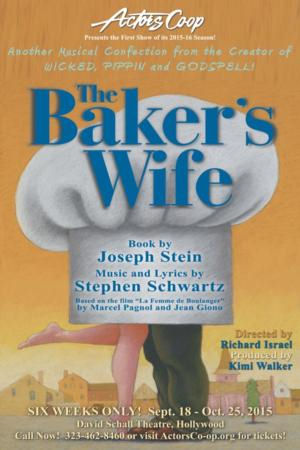
 Musicals are interesting beasts. Some get to be very well known through success on Broadway — either by the awards they win, the tours they produce, their financial success, or their performances at the Tonys. Some (especially parody musicals) get to be well known through their off-Broadway success and their cast recordings. Some just produce great cast recordings and stay small and popular in the regional markets. Then there’s that fourth class: the class that becomes well known precisely because of their failure; their creation stories having become the stuff of legend. These musicals get revived more as curiosity pieces. Occasionally, the revival overcomes whatever the reason was for the original failure; sometimes these revivals go on to great success.
Musicals are interesting beasts. Some get to be very well known through success on Broadway — either by the awards they win, the tours they produce, their financial success, or their performances at the Tonys. Some (especially parody musicals) get to be well known through their off-Broadway success and their cast recordings. Some just produce great cast recordings and stay small and popular in the regional markets. Then there’s that fourth class: the class that becomes well known precisely because of their failure; their creation stories having become the stuff of legend. These musicals get revived more as curiosity pieces. Occasionally, the revival overcomes whatever the reason was for the original failure; sometimes these revivals go on to great success.